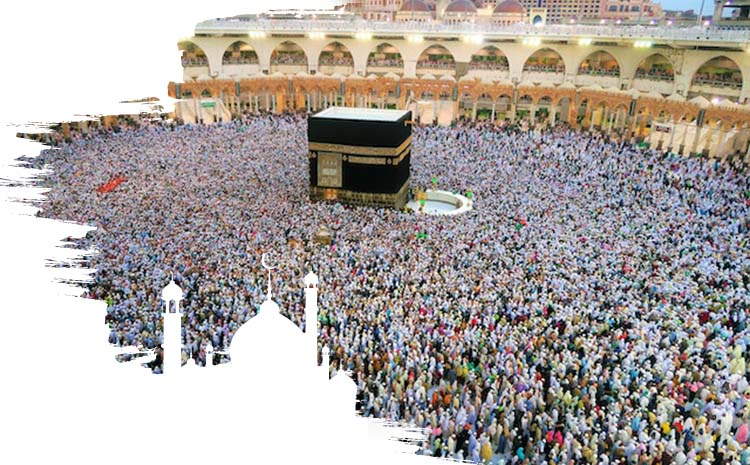A COMPREHENSIVE GUIDE TO PERFORM HAJJ: SUPPLICATIONS AND COMMON PROBLEMS
- Introduction: Hajj, the annual pilgrimage to Mecca, Saudi Arabia, is one of the five pillars of Islam. Hajjtakes place in Makkah, in Saudi Arabia, during the holy month of Dhul Hijjah, the 12th month in the Islamic calendar. Hajj takes place each year between the 8th and 12th of Dhul Hijjah. It is a sacred journey that millions of Muslims undertake with the intention of seeking spiritual purification and closeness to Allah. This article aims to provide a comprehensive guide on how to perform Hajj, including important Arabic supplications (duas) and addressing common misunderstandings associated with this significant religious obligation.
- Importance of Hajj: Hajj is a fundamental act of worship that holds immense spiritual significance for Muslims. It represents the unity of the global Muslim community and commemorates the actions of Prophet Ibrahim (Abraham) and his family. Performing Hajj is a once-in-a-lifetime obligation for those who are physically and financially able. As the Prophet Muhammad (peace and blessings be upon him) said: Whoever performs Hajj for the sake of Allah and does not utter any obscene speech or do any evil deed, will go back (free of sin) as his mother bore him. Hadith | Bukhari and Muslim
- Criteria for Hajj: Hajj is considered obligatory for financially and physically capable Muslims to perform at least once in their lifetime. The financial criteria for the obligation of performing Hajj are based on a person’s ability to afford the expenses associated with the pilgrimage. Here are some key points to understand:
- Muslim adults (whether male or female) are required to perform Hajj. This means that while children may go to Hajj, it is not required of them.
- The very weak, sick, elderly, or otherwise physically incapable Muslims are exempt from having to perform the pilgrimage.
- The Muslim must be financially able to perform Hajj. This means that a person in debt is not obliged to perform Hajj until he has cleared his debt – and must have the intention of doing so as a priority. However, if one is in debt, they may still perform Hajj as long as The creditor permits it; The debtor has time to pay off the debt; Hajj does not affect their ability to pay off the debt.
- Nisab: The financial threshold for the obligation of Hajj is determined by the concept of “Nisab,” which refers to the minimum amount of wealth a Muslim must possess before becoming liable for certain Islamic duties, including Hajj. Nisab is calculated based on the value of gold or silver.
- Ability to afford expenses: In addition to meeting the Nisab threshold, Muslims must have the financial means to cover the expenses of Hajj without incurring excessive debt or hardship for themselves or their dependents. The cost of Hajj includes travel expenses, accommodation, transportation, food, and other associated costs.
- Personal circumstances: The financial capability to perform Hajj varies depending on an individual’s financial situation and responsibilities. A person’s financial obligations, such as debts, supporting dependents, and other essential expenses, must be considered. If fulfilling these obligations would be significantly affected by the expenses of Hajj, it may be advisable to delay the pilgrimage until the financial circumstances improve.
- Prioritizing essential needs: Islam emphasizes the importance of meeting one’s basic needs and fulfilling obligations towards family, society, and oneself before undertaking acts of worship. Muslims are encouraged to prioritize fulfilling their financial responsibilities and ensuring the well-being of their dependents before embarking on the Hajj journey.
- Borrowing for Hajj: Islam discourages Muslims from incurring excessive debt or resorting to borrowing to finance their Hajj pilgrimage. It is generally recommended to save and plan for Hajj over time, rather than relying on loans or credit.
- It’s important to note that the decision of whether one meets the financial criteria for Hajj is subjective and depends on individual circumstances. Consulting with a knowledgeable religious scholar or an Islamic authority can provide specific guidance tailored to a person’s situation.
- Preparations for Hajj
- Physical preparation: Engage in physical activities to enhance stamina and endurance, as Hajj involves significant physical exertion. Consult with a healthcare professional to ensure you are physically fit to undertake the pilgrimage.
- Packing essentials: Prepare a checklist of necessary items such as appropriate clothing, personal hygiene products, first aid supplies, copies of important documents, and comfortable footwear.
- Types of Hajj: There are three forms of Hajj: Tamattu, Ifraad, and Qiran. For the purpose of this Hajj guide, we will use the Tamattu form of Hajj, which is what the Prophet Muhammad (peace and blessings be upon him) encouraged the Muslims to perform.
- Overview of Hajj
hajj - Hajj Rituals
- Ihram: Before entering the state of Ihram, bathe and cleanse yourself. you’ll enter the state of Ihram(ritual purity). For men, this means wearing the designated white cloth with one piece wrapped around your shoulder and one around your waist. Ladies may wear any clothing of their choice but should ensure they observe the rules of the Hijab. Face coverings, however, are not permitted. Fully covering shoes are also not permitted. Footwear must be in the form of sandals for both women and men. Enter the state of Ihram by reciting the intention and Talbiyah, a supplication to declare readiness for Hajj. The rules around the clothing of Ihram are extremely simple, yet strict and must be adhered to. Throughout these holy days and whilst in the state of Ihram, we should also be particularly mindful of our behavior and words. We should avoid smoking, engaging in sexual relations, swearing, shaving our hair, and cutting our nails. We must also not use perfume or scented soaps. Carry spare Ihram clothing if you can. Use comfortable trekking sandals, keeping in view the long-distance walk and avoiding blisters. break out in blisters or face discomfort once you’re there. Once you’re all set to enter the Ihram, you’ll begin reciting the following invocation called the Talbiyah:
لَبَّيْكَ اللَّهُمَّ لَبَّيْكَ، لَبَّيْكَ لاَ شَرِيْكَ لَكَ لَبَّيْكَ، إِنَّ الْحَمْدَ وَالنِّعْمَةَ لَكَ وَالْمُلْكَ لاَشَرِيْكَ لَك
Transliteration:
Labbayka Allāhumma labbayk. Labbayk lā shareeka laka labbayk. Inna al-ḥamda, wa n-‘imata, Laka wal mulk. Lā shareeka lak.
Translation:
“Here I am, O Allah, here I am, here I am. You have no partner, here I am. Verily all praise and blessings are Yours and all sovereignty. You have no partner.”
- Tawaf: Upon arriving in Mecca, perform Tawaf, circumambulating the Kaaba seven times counterclockwise while reciting specific supplications. Tawafis one of the principal rites of the pilgrimage. One Tawaf is made up of seven complete circuits, with each one starting and ending at the black stone, which is situated within the Kaa’bah. In addition to your Tawaf, you can also offer voluntary prayers to thank Allah (SWT) for arriving safely and to mark the start of this incredibly special spiritual journey.
- Sa’i: After Tawaf, proceed to Sa’i, walking seven times between the hills of Safa and Marwa, emulating Hajar’s (Hagar) search for water. You’ll begin theSa’i on the hill of Safa and walk towards the hill of Marwa. You will eventually see the green marker, at which point you will run until the next green marker and continue walking until you reach Marwa. This completes one lap. You will then return to Safa to complete your second lap. Your Sa’i is complete once you have performed a total of seven laps between the hills of Safa and Marwa. Once Sa’i is complete, men will have their hair clipped or shaved, whilst a woman clips her hair to the length of her fingertip. This marks the completion of your umrah, allowing you to leave Ihram, until the 8th of Dhul Hijjah. The 8th day of Dhul Hijjah marks the beginning of the days of Hajj and the next stage of your spiritual journey. You’ll purify yourself and enter the state of Ihram once again.
- Activities of Day 1 / 8th Dhul Hijjah: The 8th day of Dhul Hijjah marks the beginning of the days of Hajj and the next stage of your spiritual journey. You’ll purify yourself and enter the state of Ihram once again. The main activities performed on the first day of Hajj:
- Entering the state of Ihram: Before reaching the boundaries of the Haram area in Mecca, pilgrims enter a state of Ihram.
- Arrival in Mina: Pilgrim’s travel from Mecca to Mina, a nearby city, where they spend the night in tents. Mina serves as a base camp for Hajj and is the starting point for the main rituals.
- Prayers and recitation: While in Mina, pilgrims perform the five daily prayers in congregation. They also engage in supplication, remembrance of God, and recitation of the Quran.
- Preparation for Arafat: Pilgrims spend the day in Mina preparing for the next day’s main event, the standing at Arafat. They rest, perform acts of worship, and mentally prepare for the significant day ahead.
- Departure to Arafat: Before noon, pilgrims leave Mina and head towards Arafat, a vast plain located about 20 kilometers east of Mecca. It is here that the most essential ritual of Hajj, known as the Standing at Arafat, takes place.
- Day of ‘Arafah (Day 2 / 9th Dhul Hijjah):After sunrise in Mina, you’ll then head to the plains of ‘Arafah, reciting Istaghfar (asking for forgiveness) and making supplications – marking the Day of ‘Arafah when we ask Allah (SWT) for forgiveness for our sins. Upon reaching the plains of Mount ‘Arafah, pilgrims observe shortened Dhuhr and Asr prayers combined (two Rakat instead of four). However, according to Abu Hanifa, the combining of Dhur and Asr is only valid if one prays behind the Imam in the Masjid. Therefore, if one was to pray in the tent, then they should not combine both salah. After sunset, you’ll depart ‘Arafah and head to Muzdalifah – an open plain between Mina and ‘Arafah. Once you reach Muzdalifah you’ll perform your Maghrib and ‘Isha Salah, one after the other, shortening the ‘Isha Salah to two Rakat. While in Muzdalifah, you may also collect pebbles to perform Rami (the stoning of the devil) over the next three days. The size of the pebbles should be like the size of date stones/seeds. You will need a total of 49 pebbles. However, it is advised that you pick up a further 21 pebbles as a precautionary measure to bring your total up to 70. When you proceed to the phases of throwing the pebbles at the Jamarat (the stone pillars), you may miss the target, or some pebbles may fall from your hand. Therefore, it’s better to have more than to be short. Pebbles can also be collected from anywhere in Mina.
- Eid al-Adha (Day 3 / 10th Dhul Hijjah):The 10th of Dhul Hijjah is also called the Yawm al-Nahr, or the Day of Sacrifice (Qurbani). After performing Fajr Salah, you will depart Muzdalifah and go back towards Mina. Remember to continuously recite the Talbiyah this day, Pilgrims perform the Hady (sacrificing the animals) and commence the first of three days ‘stoning of the devil’s rite or Rami. Muslims around the world also offer Qurbani during this time and begin the four-day festival of Eid al-Adha.
- The stoning of the Jamarat: Otherwise referred to as the ‘stoning of the devil’ –is a ritual carried out by Hajj pilgrims whereby pebbles are thrown at three stone structures in Mina across three days. The first day of stoning occurs on the 10th of Dhul Hijjah. The act of throwing stones at the Jamarat is known as The ritual of Rami is symbolic of the actions of Ibrahim (AS) when he was faced with the trial of having to sacrifice his son, Isma’il (AS) upon the commandment of Allah (SWT). On the 10th, 11th, and 12th day of Dhul Hijjah, you will perform Rami (the stoning of the devil).You will need a total of 49 pebbles. You’ll need a certain number of pebbles for each of the three days. The breakdown is as follows:
- 7 pebbles for the 10th of Dhul Hijjah.
- 21 pebbles for the 11th of Dhul Hijjah.
- 21 pebbles for the 12th of Dhul Hijjah.
- Try to carry four small pouches per person for your pebbles. Use the four pouches to group pebbles according to the breakdown above. Once you reach the Jamarat, you will head to Jamarat al-Aqaba, which is the largest pillar, and here you will throw the first seven pebbles at the concrete pillar. You will only pelt this one pillar on the first day.
Upon each throw, you’ll say the Takbir:
“اللهُ أَكْبَرُ”
Transliteration:
“Allāhu ‘Akbar”
Translation:
“Allah is The Greatest”
- Don’t rush to perform the Rami. The Hajj authority will most likely allocate a set time for your group to go and perform Rami. They do this to minimize overcrowding and the risk to pilgrims.
- Shaving The Head (Day 4 / 11th Dhul Hijjah). After offering the Hady, you will proceed to shave or trim your hair if you are male. The Prophet Muhammad (peace and blessings be upon him) shaved his hair and this is preferable. A woman trims her hair by the length of a fingertip. Now you are allowed to leave the state of Ihram and wear comfortable clothing. You are also allowed to resume otherwise Halal activities that were forbidden in the Ihram, except for sexual intimacy. It is Sunnah (the practice of the Prophet PBUH) to apply perfume as the Prophet Muhammad (peace and blessings be upon him) smelt strongly of musk at this point.
- Tawaf al-Ifadha and Saai’ (Day 5 / 12th Dhul Hijjah): You will now go to Makkah to performTawaf al-Ifadha and then another circuit of Saai’ as part of your Hajj Tawaf al-Ifada and Sa’i are obligatory. You must perform the tawaf al-Ifadha and the Saai’ after the Rami, the Qurbani (sacrifice), and shaving (or trimming) of the head. With the completion of the Tawaf and Saa’i, you are then allowed to relax and do everything that was lawful before entering the Ihram, including engaging in marital relations. You will, however, return to your tents in Mina and continue with the remaining rituals of Hajj.
- Tawaf al-Wida (The Farewell Tawaf): You’ve now only one step left to perform before completing Hajj and departing from Makkah. The farewell Tawaf is the last rite Muslims must perform. This Tawaf is Wajib (obligatory) according to Hanafis, Shafi’is, and Hanbalis but Sunnah according to Malikis and must be performed prior to leaving the boundaries of the Haram. Omitting this Tawaf, without a valid reason, is not deemed lawful in Islam.
- Supplications for Hajj
- Saving up for Hajj
اللَّهُمَّ اكْفِنِي بِحَلالِكَ عَنْ حَرَامِكَ، وأَغْنِني بِفَضْلِكَ عَمَّنْ سِوَاكَ
Allāhumma k-finī bi ḥalālika ‘an ḣarāmika wa gh-ninī bi faḋlika ‘amman siwāka
Allah! Suffice me with what You have made lawful instead of what You have made unlawful and make me independent of all others besides You. (Al-Tirmidhi)
- Du’a for Leaving Home
بِسْمِ اللهِ، تَوَكَّلْـتُ عَلى اللهِ وَلا حَوْلَ وَلا قُـوَّةَ إِلاّ بِالله
Bismillāhi tawakkaltu ‘ala l-lāhi wa lā ḣawla wa lā quwwata illā bi l-lāh
In the name of Allah, I have placed my trust in Allah, and there is no power or might except by Allah. (Abu Dawud)
- Du’a before Entering Ihram
اللَّهُمَّ إِنِّيْ أُرِيْدُ الْعُمْرَةَ فَيَسِّرْهَا لِيْ وَتَقَبَّلْهَا مِنِّيْ
Allāhumma innī urīdu l-‘umrata fa yassirhā lī wa taqabbalhā minnī
O Allah, I intend to perform Umrah, so accept it from me and make it easy for me.
- The Talbiyah
لَبَّيْكَ اللَّهُمَّ لَبَّيْكَ لَبَّيْكَ لاَ شَرِيكَ لَكَ لَبَّيْكَ إِنَّ الْحَمْدَ وَالنِّعْمَةَ لَكَ وَالْمُلْكَ لاَ شَرِيكَ لَكَ
Labbayka allāhumma labbaik, labbaika lā sharīka laka labbaik, inna l-ḣamda wa n-ni’mata laka wa l-mulka lā sharīka laka
I am present! O Allah I am present! There is no associate with You. I am present! All praise and grace are due to You, and the dominion. There is no associate with You! (Muslim)
- Du’a when Entering the Masjid
اللَّهُمَّ افْتَحْ لِي أَبْوَابَ رَحْمَتِكَ
Allāhumma f-taḣ lī abwāba rahmatika
O Allah! Open the doors of Your mercy for me. (Al-Nasai)
- Du’a when Seeing the Ka’abah
اللَّهُمَّ زِدْ هَذَا البَيْتَ تَشْريفًا وَتَعْظِيمًا وَتَكْرِيمًا وَمَهَابَةً، وَزِدْ مِن شَرَّفَهُ وكَرمَهُ مِمَّنْ حَجَّه أو اعْتَمَرَه تَشْرِيفًا وَتَكْرِيمًا وَتَعْظِيمًا وَبِرًّا
Allāhumma zid hādha l-bayta tashrīfan wa ta’żiman wa takrīman wa mahābatan, wa zid man sharrafahū wa karramahū mimman ḣajjahū wa’tamarahū tashrīfan wa ta’żiman wa takrīman wa birran
O Allah! Increase this House in honour and reverence and nobility and awe, and increase those who honour and revere it as pilgrims for Hajj and Umrah in nobility and goodness and status and righteousness (Ibn ‘Abd al-Barr, Ibn Taymiyyah)
- Du’a after Every Prayer
اللَّهُمَّ أعِنَّيْ عَلَى ذِكْرِكَ، وَشُكْرِكَ، وَحُسْنِ عِبَادَتِكَ
Allāhumma a’innī ‘alā dhikrika wa shukrika wa ḣusni ‘ibādatika
O Allah! Help me to remember You and thank You and help me to the best manner of worshipping You. (Al-Adab Al-Mufrad)
- Du’a when Beginning Tawaf
اللّهُمّ إيْمَاناً بِكَ، وَتَصْدِيْقاً بِكِتَابِكَ وَسُنّةِ نَبِيِّكَ صَلَّى اللهُ عَلَيْهِ وَسَلَّمَ
Allāhumma īmānan bika wa taṣdīqan bi kitābika wa sunnati nabiyyika ṣalla l-lāhu ‘alayhi wa sallam
O Allah! Out of faith in You, conviction in Your book and Your Prophet’s way. (Sunan al-Kubra)
- Du’a Between the Yemeni Corner and the Black Stone
رَبَّنَا آتِنَا فِي الدُّنْيَا حَسَنَةً وَفِي الآخِرَةِ حَسَنَةً وَقِنَا عَذَابَ النَّارِ
Rabbanā ātinā fi d-dunyā ḣasanah wa fi l-ākhirati ḣasanah wa qinā ‘adhāba n-nār
Our Lord! Grant us success in this life, and success in the next life, and protect us from the Fire! [Q, 2:201]
- Du’a when Drinking Zamzam
اللَّهُمَّ إِنِّي أَسْأَلُكَ عِلْمًا نَافِعًا، وَرِزْقًا طَيِّبًا، وَعَمَلًا مُتَقَبَّلًا
Allāhumma innī as’aluka ‘ilman nāfi’an wa rizqan ṭayyiban wa ‘amalan mutaqabbalan
O Allah! I ask you for beneficial knowledge, and pure sustenance, and accepted actions. (Ibn Majah)
- Du’a during Arafah
لَا إِلَهَ إِلَّا اللَّهُ وَحْدَهُ لَا شَرِيكَ لَهُ لَهُ الْمُلْكُ وَلَهُ الْحَمْدُ بِيَدِهِ الْخَيْرُ يُحْيِي وَيُمِيتُ وَهُوَ عَلَى كُلِّ شَيْءٍ قَدِيرٌ
Lā ilāha illa l-lāhu waḣdahū lā sharīka lahū lahu l-mulku wa lahu l-ḣamdu wa huwa ‘alā kulli shay’in qadīr
There is no God but Allah alone, with no partner or associate, His is the dominion, to Him all praise is due, all goodness is in His hand, He grants life and death and He has power overall things. (Al-Tirmidhi)
- Du’a when greeting other Pilgrims
قَبِلَ اللهُ حَجَّكَ وَكَفَّرَ ذَنْبَكَ وَأَخْلَفَ نَفَقَتَكَ
Qabila l-lāhu ḣajjaka wa kaffara dhambaka wa akhlafa nafaqata
May Allah accept your Hajj, and erase your sins, and replenish your provisions. (Al-Tabarani)
- Du’a when Entering Madinah
اَللهُمَّ هَذَا حَرَمُ نَبِيِّكَ فَاجْعَلْهُ وِقَايَةً لِيْ مِنَ النَّارِ وَآمِنَّا مِنْ الْعَذَابِ وَسُوْءِ الْحِسَابِ
Allāhumma hādhā ḣaramu nabiyyika fa j-‘alhu wiqāyatan lī mina n-nāri wa āminnā mina l-‘adhābi wa sū’i l-ḣisābi
O Allah! This is the Sacred Precinct of Your Prophet, so make it a protection for me from the Fire and a security from punishment and a bad reckoning. (Al-Ikhtiyar)
- Du’a when Returning Home
آيِبُونَ تَائِبُونَ عَابِدُونَ لِرَبِّنَا حَامِدُونَ
Āyibūna tā’ibūna ‘ābidūna li rabbinā ḣāmidūna
(We are those) who return, who repent, who worship our Lord, who praise. (Muslim)
- Common Misunderstandings
- Completing Hajj guarantees personal forgiveness: While Hajj is a significant act of worship, forgiveness, and acceptance ultimately rest with Allah. It is essential to continue striving for righteousness and seeking forgiveness beyond Hajj.
- Wealth determines the quality of Hajj: Hajj is not a competition for material possessions. A sincere and humble heart is of utmost importance.
- Hajj is only for the elderly: Hajj can be performed by individuals of all ages, provided they are physically and financially capable. Younger pilgrims are encouraged to experience this transformative journey early in life.
- No Zakkat on Money Saved for Hajj: This saved money should be added to any other wealth you have, and you must pay zakah on it if it has reached the Nisab and a full lunar year has passed while it has been in your possession. That should be done until you have spent the money on the journey of Hajj.
- Conclusion: Performing Hajj is a deeply spiritual experience that requires proper preparation, adherence to rituals, and a profound connection with Allah. By understanding the steps, reciting Arabic supplications, and dispelling common misconceptions, pilgrims can embark on this sacred journey with devotion, humility, and a desire for spiritual growth. May Allah accept the Hajj of all the pilgrims and shower them with his blessings and mercy.






